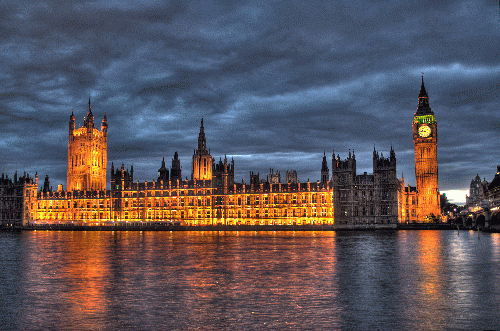With its royal family, bewigged judge, and ancient parliament, the United Kingdom appears increasingly likely that it will not be able to withstand the stresses and strains of a hard Brexit. The chief culprit is the increasingly explosive debate over where to place the hard borders that Brexit will inevitably create.
At bottom the debate is quite simple. BoJo wants to place it in between the Irish Republic and U.K.-ruled Northern Ireland where a current EU-supervised friction-less border now exists. Fears that cutting off Northern Ireland in this way will lead to a rebirth of "the Troubles" are unfounded, he adds, because an array of hi-tech monitoring devices will render it no less easily crossable. "If they could use hand-knitted computer code to make a friction-less re-entry to Earth's atmosphere in 1969," he argues with characteristic blitheness, "we can solve the problem of friction-less trade at the Northern Irish border."
But it's a pipe-dream for the simple reason that, as Hettie O'Brien observes in the New Statesman, monitoring some 110 million crossings per year will require a degree of British government surveillance that both sides will find intolerable. Thus hard borders mean just what they suggest, i.e., a hard reality of border posts and customs checks, not to mention smuggling and gun running.
But there's another alternative: creating a hard border not on land but along the Irish Sea, with Ireland the island, that is on one side and Great Britain on the other. The advantage is that patrolling a few seaports is a lot easier than policing some "300 miles of lanes and cart tracks," as Jenkins describes it. The disadvantage, at least as far as London is concerned, is that locking two Irish jurisdictions in a single customs union under EU auspices will bring Belfast closer to Dublin and hence to Brussels, the EU capital, as well. With 56 percent of Northern Irish voting against Brexit and 60 percent in favor of continuation of the customs status quo, economic union will eventually give way to a political union, which means that the United Kingdom of Great Britain and Northern Ireland will cease to exist.

Westminster Palace, aka Houses of Parliament, and Big Ben, at night.
(Image by (Maurice via Flickr)) Details DMCA
A Traumatized England
Irish nationalists, who have advocated such a solution for more than a century, will rejoice. But what are the implications for Britain? With Scotland voting to remain in the EU by an even greater margin, 68 to 32, it means that it might also throw in its lot with Brussels. If so, a traumatized England will be reduced to a hard-right rump seething in anger at Ireland and Scotland for leaving it in the lurch. With leftists in disarray and extreme nationalists in the saddle, what's left of the welfare state will disappear as England positions itself as the low-wage alternative to an over-regulated EU.
It's not hard to imagine the reaction on the other side of the Atlantic. Trump will rub his hands in glee as a liberal nation-state bites the dust. Then he'll go on the prowl for fresh opportunities abroad.
Perhaps he can persuade Hong Kong to separate from China. Maybe Hungarian-speakers will break away from Romania under U.S. influence and throw in their lot with Budapest. Perhaps Greenland will separate from Denmark and sell itself to the U.S.. With the capital city of Nuuk growing positively balmy thanks to global warming, Trump may be able to fill it with glittering high-rises after all.
(Note: You can view every article as one long page if you sign up as an Advocate Member, or higher).





